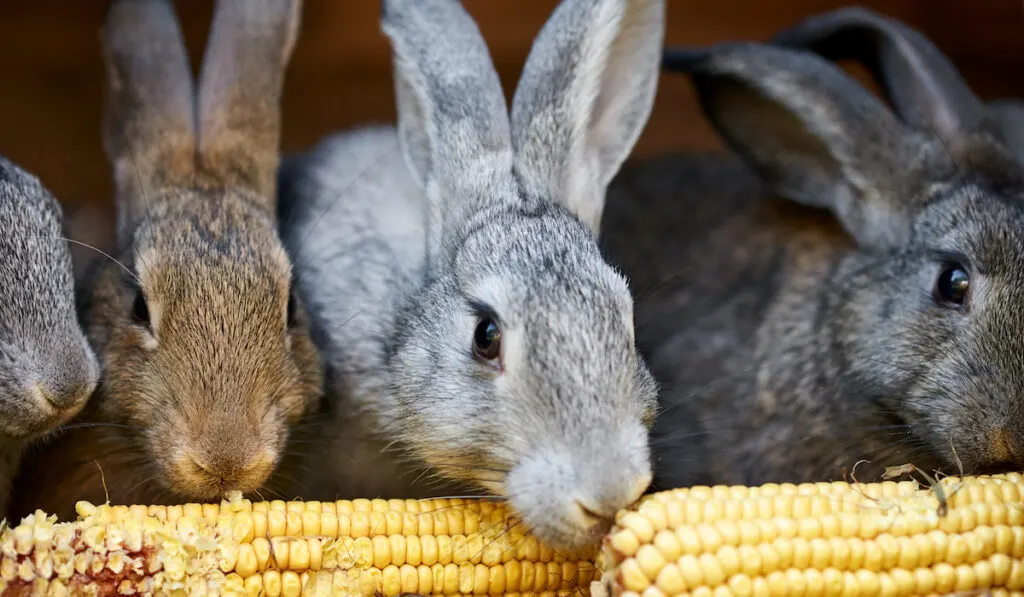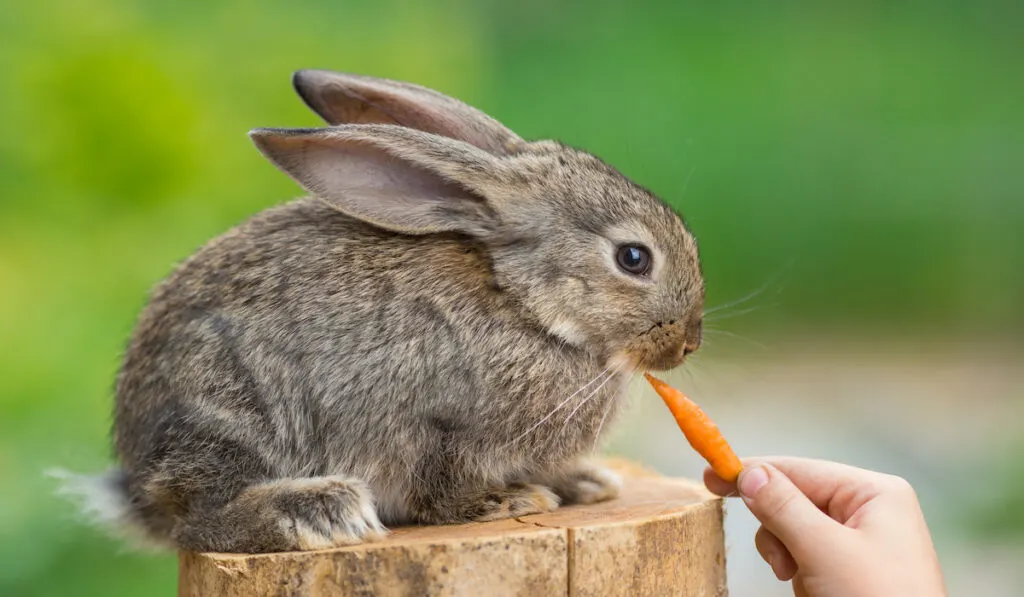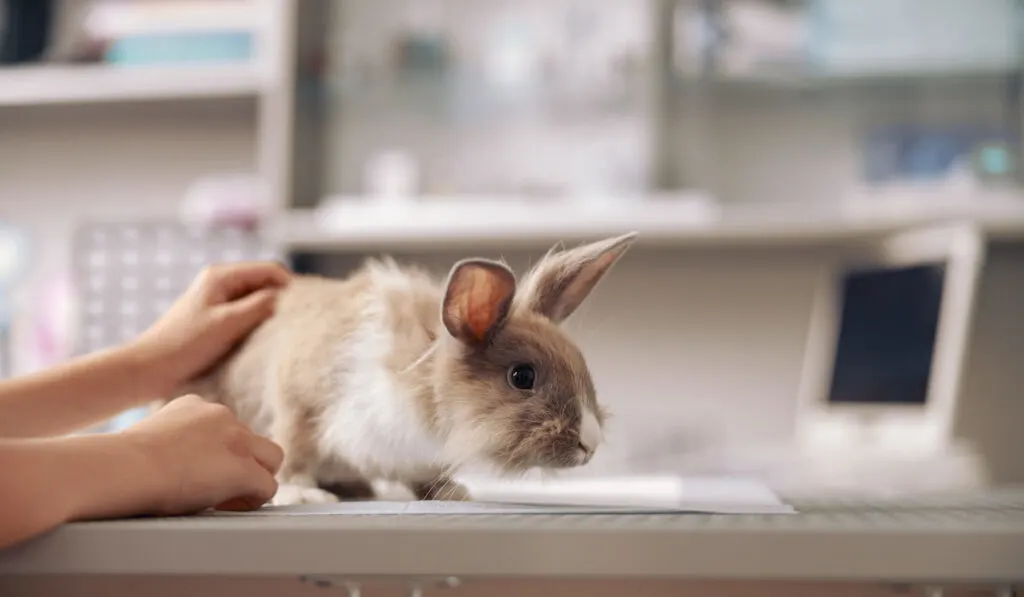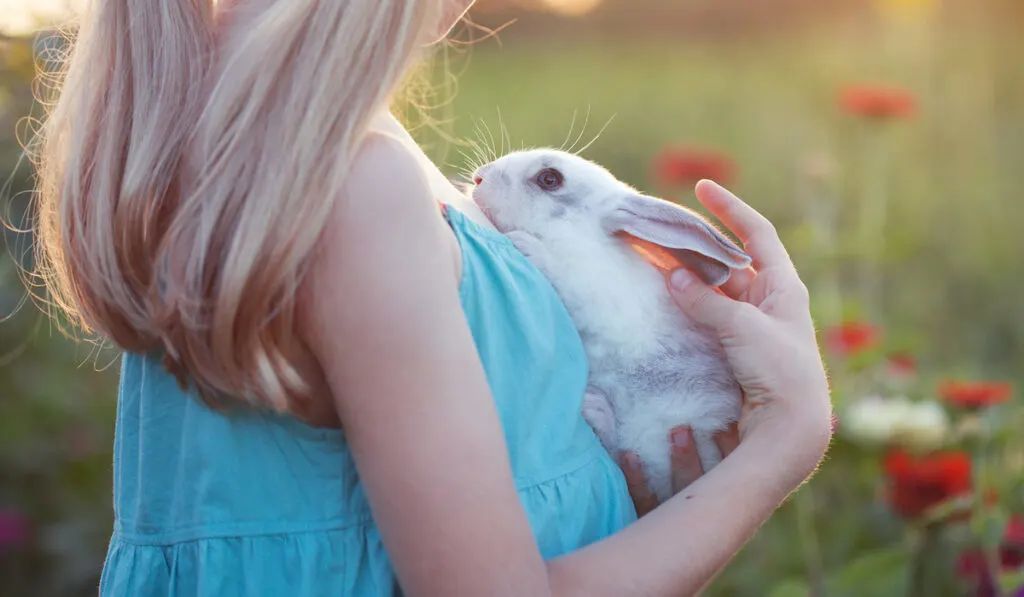So you’re hanging out with your rabbit, and you hear a distinctive pff, and now you’re wondering if your rabbit just passed gas. Many animals do.
But, do rabbits fart? Yes, rabbits can and should fart. Farting is a normal part of being a rabbit caused by a high fiber diet and a digestive system that relies on microorganisms to process food before the rabbit’s body can digest it. However, excessive farting is not normal and is usually caused by a diet rich in starches and sugar.

While rabbit farts are a normal part of living with and caring for a rabbit, there are some things you should know. Continue reading to learn everything you need to know about your rabbit and its gas.
Table of Contents
Can Rabbits Fart?
Just like with humans, the amount, sound, and smell of a rabbit’s farts will vary from rabbit to rabbit and depend on what types of food they’ve recently consumed.
All rabbits can fart, and all rabbits should fart because it is how their bodies release the gas produced by microorganisms in their gut that help process the high fiber diet.
Many rabbit owners report being able to hear and smell their bunnies passing gas, but others have never detected any sign of their rabbit’s flatulence. So, even if you don’t notice your bunny farting, it definitely is happening!
What Causes Rabbits to Fart?

Rabbits fart because they need to fart. To fully understand why rabbits fart, it is essential that you understand how a rabbit’s digestive system works.
Here how the digestive process works in rabbits:
- The rabbit consumes the food.
- The food passes through their esophagus to their stomach, where the food is broken down before traveling into the small intestine.
- The small intestine extracts the nutrients from the good.
Sounding familiar, right? Well, here’s where things start to get complicated.
- The food then passes into the colon, which sorts the food. Crazy right? It moves undigestible fiber along (and your rabbit poops it out!), and the food that is digestible, it moves to the caecum, a sort of pouch in the digestive system that is home to microorganisms that can break down the digestible fiber further.
- Once food has been processed, it will move out of the caecum, and your rabbit will poop it out, but it won’t look like their regular pellets. It will look more like a moist cluster of small pellets, and it known as cecal pellets.
- The rabbit reingests the cecal pellet. Now that it has been processed by the microorganisms in their caecum, their small intestine can extract nutrients from it—kind of gross, but also kind of incredible.
Now the reason rabbits fart is that all that “processing” done by the microorganisms in the caecum creates a lot of gas!
Will Diet Cause a Rabbit to Fart?

A rabbit’s diet will directly impact how often it farts. Foods that are starchy and high in sugar will cause more gas in rabbits because of how the microorganisms respond to these foods.
Here are some foods that may be causing your rabbit to have gas:
- Beans, Legumes, Peas
- Grains
- Starchy root vegetables like carrots
- Fruit
These foods are not recommended as the main components of a rabbit’s diet anyway. The best thing to feed your rabbit is grass or hay. This will help keep their digestive system running smoothly and with only a normal amount of gas. These starchy and sugary foods should only be used as treats for your bunny.
Farting May be a Sign of GI Stasis in Rabbits

A rabbit farting is generally not seen as problematic unless your bun is showing signs of stress or discomfort. However, it can sometimes be a sign that something is wrong.
GI Stasis, also known as ileus, is when a rabbit stops moving food through its digestive system or slows down the movement drastically. It can be deadly for rabbits, and if you aren’t paying attention to their eating and pooping habits, you might miss the signs.
Generally, a rabbit’s digestive system won’t suddenly stop working. There are signs, and it happens over time. Here is what you should look out for:
- Rabbit isn’t pooping
- Pellets that are small
- Rabbit stops eating
- Excessive gas
GI Stasis is uncomfortable for your rabbit, so you’ll be likely to notice that something is off with your pet.
Can Excess Gas Cause Medical Issues in a Rabbit?
Like we said, in general, a rabbit farting is a good sign. It means that gas is exiting the rabbit, and the old adage of “better out than in” applies here. As long as the gas is not building up in your rabbit’s intestines, then it is not causing a medical issue.
However, if your rabbit isn’t farting, and the gas is building up, that is another story.
Is Not Farting a Problem for Rabbits?
A rabbit that cannot release the excess gas that naturally builds up in their intestines needs to be taken to a veterinarian as soon as possible.
Here is what your rabbit’s lack of farting can mean:
- Bloat: Bloat, which is a build-up of gas in a rabbit’s stomach that leads to distension, is a big problem for rabbits. It is unclear what causes bloat, but it will be clear that your rabbit is unwell as it can be very painful.
- Intestinal blockage: An intestinal blockage, often caused by hairballs, can lead to a bloat-like condition where your rabbit cannot pass its gas.
- GI Stasis: If a rabbit cannot pass gas and it becomes stressed because of gas pain, this can cause GI Stasis.
Of course, it isn’t like you can know if your rabbit is farting all the time. For one, you can’t always hear them. Be on the looking out for other signs that your rabbit is ill, and usually, if a rabbit is eating and acting normally, it is healthy.
How Can You Help Your Rabbit Fart?

Under normal circumstances, you won’t need to help your rabbit fart, but if your rabbit is showing signs that it cannot pass gas, there are some things you can and should try.
Here are some signs that your rabbit cannot pass gas:
- Loud gurgling noises in the rabbit’s stomach, which can be heard with a stethoscope and sometimes felt by placing a head on your bunny’s stomach.
- Your rabbit appears to be in discomfort. The pain will cause stress in your rabbit, so look for signs of stress.
Once you’ve determined that gas is the problem, here are some things you can try to help your rabbit pass gas.
- Pediatric simethicone drops. Using a dropper, administer 1 mL per hour for three consecutive hours. There should be a noticeable difference after the third dose. (https://youtu.be/LbyC6CWbm5M)
- Belly rubs! Slip your hands under your rabbit and gently massage its belly. You might hear your rabbit pass gas, and you will likely feel it gurgling. Check out this video for a demonstration of the proper technique. Rabbits generally love belly rubs, so you can make it a regular part of caring for them.
- Water. Make sure your bunny stays hydrated. You can drip water into its mouth with a dropper if it isn’t drinking enough. Dehydration can quickly lead to serious complications in rabbits.
- See a vet. If symptoms do not improve, you should call your vet.
Really, if you hear your rabbit farting, it is no problem! As you can see, it is much more worrying when a rabbit is unable to release the gases building up in its digestive system.
